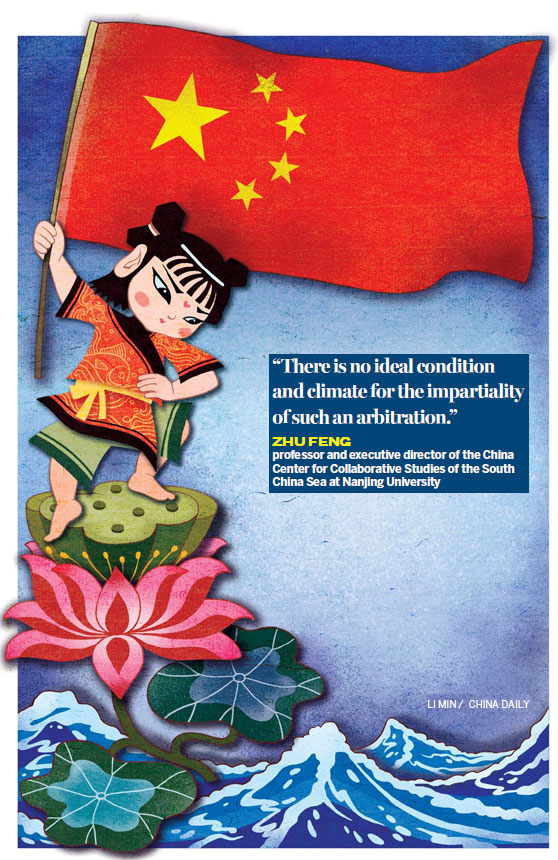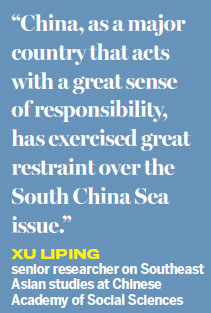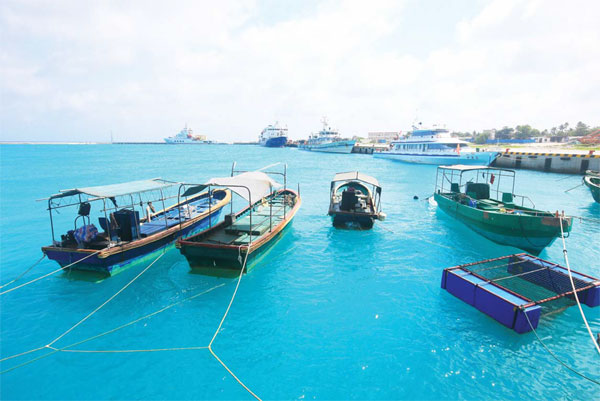Shoring up support
Updated: 2016-07-08 08:07
By Zhang Yunbi(China Daily Europe)
|
|||||||||
Over 60 countries and regional organizations back China's position on South China Sea sovereignty issues
With a ruling in the South China Sea arbitration case set to be unveiled, an increasing number of countries have echoed China's position expressing concern about what it calls the expansion and abuse of power of the arbitral tribunal in The Hague.
The tribunal, established without the consent of the Chinese government to tackle the case brought by the Philippines, is expected to issue a ruling on July 12.

The case challenges Beijing's territorial sovereignty and maritime delimitation in the South China Sea, while China has called on the international community to respect historical evidence instead of adding to regional tensions.
Huge controversy was prompted in international law circles as Manila sought compulsory arbitration under the United Nations Convention on the Law of the Sea for establishing the tribunal.
The 60-plus countries that have voiced support for China include India, Russia, Kenya, and several regional organizations such as the Arab League.
Foreign Ministry spokesman Hong Lei told a news conference in Beijing on July 5 that the tribunal's expansion and abuse of power has led to concerns that it will "seriously impact the order of international law and bring no benefit to efforts in safeguarding peace and stability in the South China Sea region".
Zhu Feng, professor and executive director of the China Center for Collaborative Studies of the South China Sea at Nanjing University, says the process of establishing the tribunal has been questioned for a range of problems, and political factors are behind the expanded jurisdiction of the tribunal.
"There is no ideal condition and climate for the impartiality of such an arbitration, as some countries and media in the West are interfering," Zhu says.
Hong, the spokesman, also referred to voices calling for fulfillment of the Declaration on the Code of Conduct on the South China Sea, a document signed by China and all member states of the Association of Southeast Asian Nations in 2002.
Article 4 of the document states a commitment to two-way settlement of disputes.
Yet the arbitration "will have a serious impact on cooperation within the framework of the DOC as well as the consultations for formulating the code of conduct in the South China Sea", Hong warned.
Xu Liping, a senior researcher on Southeast Asian studies at the Chinese Academy of Social Sciences, says the Philippines should not forget that it is a member of ASEAN. "Its unilateral seeking of arbitration has run against the DOC and poses a betrayal of ASEAN.
"China, as a major country that acts with a great sense of responsibility, has exercised great restraint over the South China Sea issue," Xu says. "China has maintained its open attitude toward dialogues for resolving the South China Sea issue."
As part of the increasing international support for China's position, Cambodia and Myanmar fully support peaceful negotiations by all parties to resolve their disputes over the South China Sea, Cambodian Prime Minister Hun Sen said on July 4.

The statement was posted on his Facebook page after meeting with Myanmar's new ambassador to Cambodia, Myint Soe, in Phnom Penh.
Calls for talks
China has rejected being part of the compulsory arbitration proceedings partly because the case involves sovereignty and maritime delimitation, which it declared in 2006 are issues that are not subject to any third-party arbitration.
The administration of former Philippine president Benigno Aquino III unilaterally initiated arbitration proceedings against China in 2013.
Although the past cabinet led by Aquino said it had exhausted all diplomatic approaches before seeking arbitration, the Chinese Foreign Ministry said last month that Manila did not embark on any serious two-way negotiations over the claims it had raised with the tribunal.
A new president, Rodrigo Duterte, was inaugurated in the Philippines on June 30.
Wilson Lee Flores, an analyst and columnist for the Philippine Star newspaper, says he expects "more pragmatism and bilateral diplomacy to prevail in the Duterte government's dealings with China, instead of the past six years of confrontations".
Normalizing bilateral relations with China would help to balance the Philippines' foreign policy with its traditional ally, the United States, Flores says.
After new Philippine cabinet members struck a conciliatory tone on the upcoming ruling in the maritime arbitration case against China, Beijing said disputes with the Philippines could be properly managed and resolved only "through negotiation and consultation", not arbitration.
On July 1, Foreign Ministry spokesman Hong said at a news conference: "The South China Sea arbitral case raised by the Aquino administration is illegal and invalid. It is hoped the Philippines will meet China halfway and properly tackle relevant disputes."
Duterte told a cabinet meeting not to "flaunt" a ruling if it is favorable, and said there should be "a soft landing" in disputes with China about the South China Sea, according to Xinhua News Agency.
Philippine Foreign Secretary Perfecto Yasay was quoted by Xinhua as saying he was "averse" to issuing a "strong" statement if the ruling is favorable.
Li Guoqiang, a senior researcher at the Chinese Academy of Social Sciences' Institute of Chinese Borderland Studies, says: "For all the disputes concerning the South China Sea, negotiation is the only choice and the only viable approach. Confrontation will never help to resolve the South China Sea issue."
Li says that no matter how the tribunal rules, he believes the situation will not go into free fall, but that the decision will possibly lead to some "new chaos" that could include new confrontations.
"No matter how the new president acts on the ruling, diplomatic negotiation is second to none. Using the ruling as a condition for resuming diplomatic consultations will not be viable," Li says.
Xue Li, a researcher on international strategy studies at the Chinese Academy of Social Sciences, says China will not sit by if the Philippines calls on China to comply with the ruling.
Instead, dropping the result of the arbitration and resuming two-way negotiations with Beijing to resolve disputes "may serve as a turning point in the icy two-way ties", Xue says.
Washington - a major ally of Manila - has publicly pressed Beijing to accept the ruling.
Jin Canrong, a professor of international relations at Renmin University of China, notes that the wisest approach for the new Philippine cabinet and the US is to embark on "a cooling-down treatment" to put aside the ruling and refrain from hyping it.
Zhang Junshe, a senior researcher at the People's Liberation Army Naval Military Studies Research Institute, says some in the US still want to contain China by enforcing an alignment between the US and its allies.
"The US side has not fully respected China's core interests and major concerns and the recent US military's freedom of navigation actions in the South China Sea have worsened its mutual trust with its Chinese counterparts," Zhang says.
Historical evidence
A South China Sea history symposium held at the Chinese Academy of Social Sciences on June 30 unveiled a slew of historical documents archived by authorities in Taiwan.
Key evidence supports China's sovereignty over the islands there.
A bilingual version of a document called The Map of South China Sea Islands and Maritime Features 1935 names the islands there in both English and a Latinized version of Chinese. For example, it marks the Nanhai, or South China Sea.
An official archive was unveiled including documents and photos about Taiwan officials retaking a weather station in the Xisha Islands in 1945 from Japanese invaders. The station, in the South China Sea, was transferred to the control of officials of the central government of the time, the Republic of China, in 1946.
An English-language request was granted by Taiwan authorities in 1960 for US military personnel to visit and measure some islands in the South China Sea, including Jinghong Island of the Nansha Islands.
zhangyunbi@chinadaily.com.cn
|
Fishing boats dock at Yongxing Island, Sansha city, South China's Hainan province. China has called on the international community to respect historical evidence instead of adding to regional tensions over the South China Sea issue. Zha Chunming / Xinhua |
(China Daily European Weekly 07/08/2016 page1)
Today's Top News
2 gored in bull run; bullfighter killed
G20 economies to improve global trade governance
Suspect in Dallas attack wanted to 'kill white people'
5 Dallas police killed at protest against police shooting
Ministry slams US-Korean THAAD deployment
Shoring up support
UK Iraq report highly critical of Tony Blair
UK invasion of Iraq was not last resort: Report
Hot Topics
Lunar probe , China growth forecasts, Emission rules get tougher, China seen through 'colored lens', International board,
Editor's Picks

|

|

|

|

|

|








